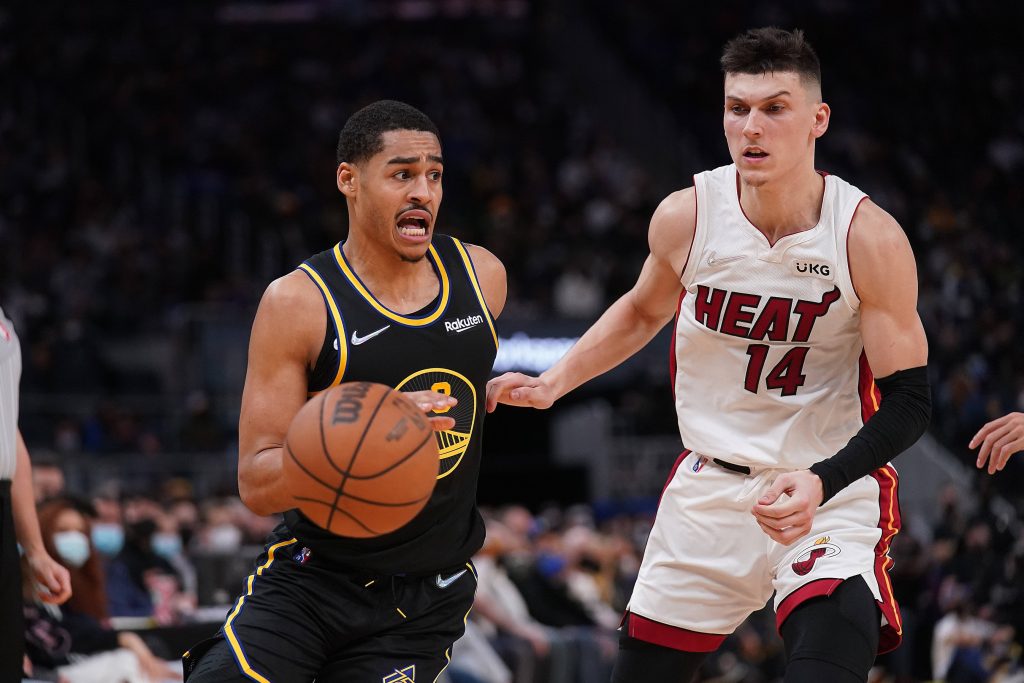The Miami Heat extended the contract of guard and reigning Sixth Man of the Year Tyler Herro, giving him a four-year deal that is worth $130 million.
Miami’s move locks up Herro, an integral part of the team’s offense, for the long term. Last season, Herro averaged 20.7 points, 5.0 rebounds and 4.0 assists per game during the 2021-22 regular season while shooting 44.7 percent from the field and 39.9 percent from beyond the arc.
He increased his points and assists per game from the 2020-21 season while shooting better percentages from the field and 3-point range.
The Golden State Warriors have guard Jordan Poole, a former first-round pick, who broke out during the 2021-22 season. With Poole entering the final year of his rookie deal, the Warriors have to decide whether or not they are willing to offer him a long-term extension.
The Athletic’s Anthony Slater explained how Miami’s move to extend Herro affects things for Golden State.
“The two sides — the Warriors’ front office and Poole’s representatives — tentatively plan to meet now that the team has returned from Tokyo,” Slater wrote. “No official time has been set, but the landscape has been altered. Had they convened before Herro signed, the Anfernee Simons and RJ Barrett contracts would’ve served as the best comparison points. But that’s $100 million for a scoring guard who only blossomed on a lottery team and $107 million for a wing with offensive efficiency concerns but higher defensive upside.
“Neither scenario mirrors Poole’s like Herro’s. The Warriors have a high level of respect for how the Heat do business, from the mutual respect between Steve Kerr and Erik Spoelstra to how sharply Bob Myers and the Lacobs know Pat Riley and Andy Elisburg handle the salary cap and organize the roster to compete consistently.”
Poole, who played a major role for Golden State during its title run in the 2021-22 season, could potentially use Herro’s contract as a comparison point in negotiations. Slater explained that they are in a slightly different situation than the Warriors, and that Miami could have extended Herro to make sure he’s also trade eligible following the 2022-23 season.
The issue for Golden State is with the luxury tax, as the team is a repeat offender, and it would almost certainly remain there if Poole received a massive extension.
“The Warriors have a skyrocketing repeater tax to consider and that profiles as the most significant difference in the two cases,” Slater wrote. “Miami isn’t living in nearly as punitive a financial world. Every dollar the Warriors can shave away is multiplied by nearly eight or beyond, depending on how else they go about finalizing next season’s expensive roster. Joe Lacob may give a can’t-budge limit, which is why they lost Gary Payton II. But tax penalties aren’t of Poole’s (or any player’s) concern. Herro’s deal has reset his market in the clearest way imaginable and there is no salary cap rule restricting it from being offered.”
During the 2021-22 season, Poole averaged 18.5 points, 3.4 rebounds and 4.0 assists per game while shooting 44.8 percent from the field and 36.4 percent from beyond the arc.
Poole didn’t win the Sixth Man of the Year award like Herro, but his numbers were eerily similar. Playing in an offense that also features Klay Thompson and Stephen Curry, one could argue that Poole produced at an even higher level than Herro as a scorer, since he took just 13.9 shots per game to Herro’s 17.0 field-goal attempts per night.
The Heat were smart to avoid a potentially messy free agency with Herro next offseason, while the Warriors are now facing a tough decision on Poole, depending upon how he uses Herro’s new deal as leverage.



